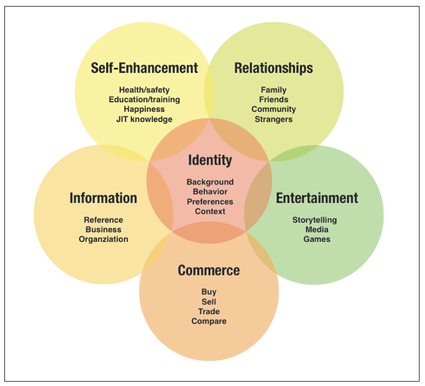Authors: Aaron Marcus
Posted: Thu, January 24, 2013 - 4:04:08
In past decades, we were drowning in a sea of undigested data. Today, we are drowning in a deluge of extreme, untamed social media growth.
A half-decade ago, intrigued by the appearance of social networks and wishing to investigate these new media for communication, I signed up for just about everything that came my way: Facebook, LinkedIn, Naymes, H5, and in later years, Google+, Academia.com, ResearchGate.com, etc. For a while, it was OK. I could ignore the various emails and updates that arrived.
Today, in my inbox every day comes yet another batch of LinkedIn announcements that three colleagues have recommended me for my various areas of expertise. When I first started to receive these approbations, plus implied requests for reciprocal endorsements (I patted you on the back; won’t you now be so kind as to do the same for me, and maybe three or 30 other people for seven plus-or-minus two areas of expertise?), I was confused, and contacted someone about what the netiquette was: Am I obliged to pay back? He said it was optional. I haven’t searched for the statistics, but I assume many do not bother acknowledging or returning the favors. Like many aspects of social media, such as “liking,” the meaning of these traditional acts has been changed by the social networks. Some would say corrupted or debased. Perhaps those with minimal credentials are praising their teachers and mentors hoping for some reciprocal action that will enhance their own stature. I, for one, have abandoned even opening such emails. Yet more social network flotsam and jetsam.
But it doesn’t stop there. Now that I have joined ResearchGate, which competes with Academia, ResearchID, Mendeley, and Epernicus, I am being pinged numerous times regarding my latest publication postings—who is following me, who I might like to follow, how I can increase my “score,” and other news items, similar to those of LinkedIn, Facebook, and the like. The Internet has turned into a busy, buzzing, confusing cacophony of hawkers, barkers, and friendly reminders. We are indeed in the middle of a 21st-century version of a busy Middle Eastern souk, or bazaar, with people yelling at us from every side.
Some years ago, I published an analysis of what I thought the future held for us in user-experience spaces—six of them, to be precise:

I-ware: The data/information about ourselves and our identities that we share with others (or that is taken surreptitiously by others).
You-ware: The relationships we make/maintain with family/friends, colleagues/professionalcommunities, or complete strangers and the world at large.
Fun-ware: Access to storytelling, media, and games providing entertainment and diversion.
Buy-ware: Access to content, products, and services that we can buy, sell, share, and compare.
Know-ware: Access to content of large databases that we can check as references, use for business, or for organizations in which we work, play, or travel.
Be-ware: Access to just-in-time knowledge and learning that can enhance our selves, our bodies, our cognitive and emotional conditions, and our general happiness and health.
When AM+A originally conceived of these UX spaces in about 2002, I thought of them as separate categories of software. What I did not realize then, but certainly realize now, is that almost every business, organization, or Internet entity is seeking to become all of these at once (or as soon as is practical) in a desire to obtain larger communities of networked, addicted, loyal (to the extent that Internet users have any loyalty), bonded (in many senses of the term) members of that customer market, social group, or society.
Alas, all of these entities are pleading, bargaining, offering, cajoling, in ever-more frequent and strident messages. The net result is that many are beginning to turn off their attention, as I am, to many or most of these messages. My inbox is filling up with more and more items that escape my spam and junk filters because the senders have, occasionally, sent useful messages. It is becoming always more time consuming, and challenging, to find the jewels and scrape away the dross.
In addition, no source that I know of gathers all the content, all the passwords, all the maintenance, and all the connections into one place that serves all the disparate needs of these heterogeneous sources and resources, all of which are trying to make themselves unique and irreplacable.
We all need smart, sophisticated, sensitive, trustworthy executive-assistant email-readers. When will we get such a person, robot, or application? It is not clear. I long for the day. In the meantime, it is a new day. I continue to plow through the rubbish of my once relatively clean inbox, hoping for the best, preparing for the worst.
Posted in: on Thu, January 24, 2013 - 4:04:08
Aaron Marcus
View All Aaron Marcus's Posts







Post Comment
No Comments Found